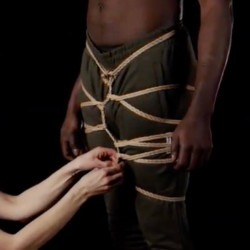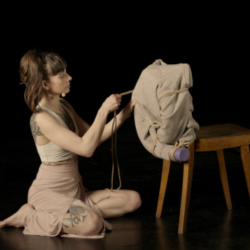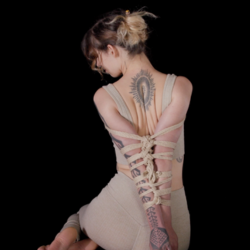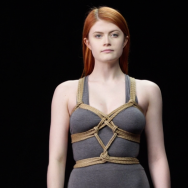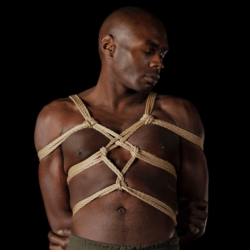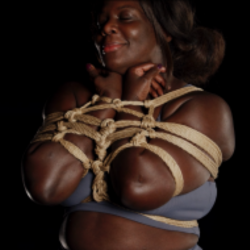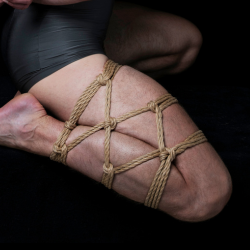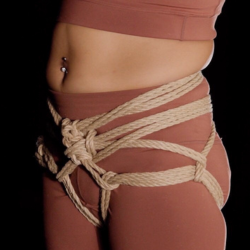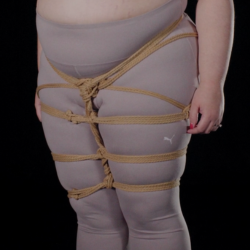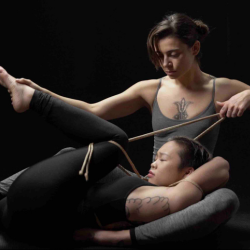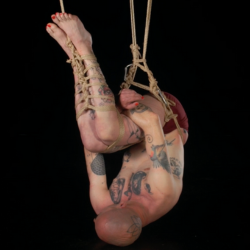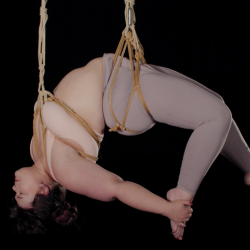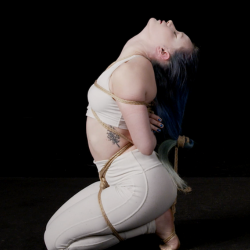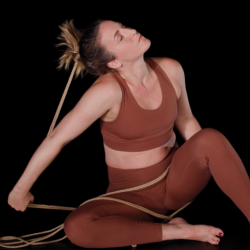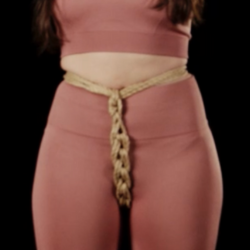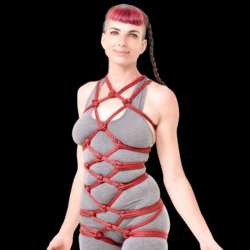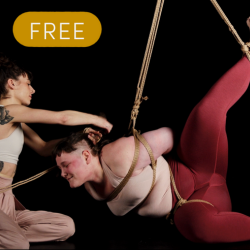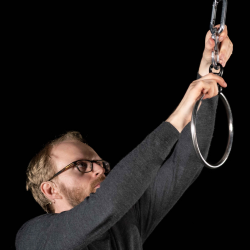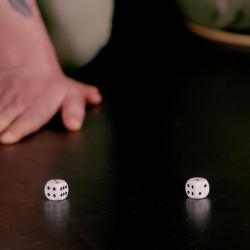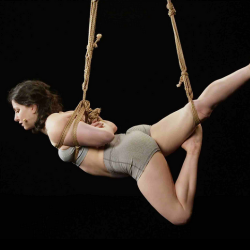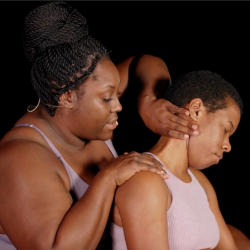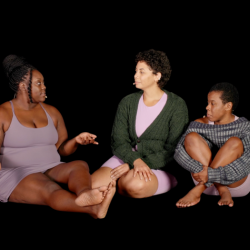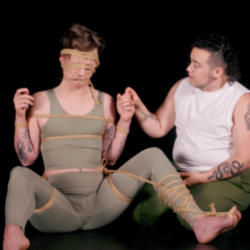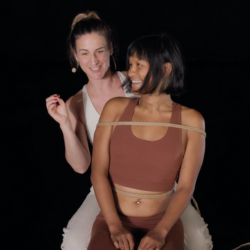EP 43
GOODMOSTTIMES
Leading questions prime the person being asked to agree! Melissa aka. GoodMostTimes chats about active bottoming, the importance of reflection and feedback for rope bottoms, and the challenges in class settings. She also talks about the opening of Devil Mask Studio in Los Angeles.

goodmosttimes AKA Melissa (she/her) started her rope education, as a bottom, in early 2012. She has since been expanding her knowledge as a switch and loves to share new techniques from both sides of a tie. Fortunate to be based in Los Angeles, CA, she has happily been part of the Devil Mask Society since its inception. She is now one of the lead instructors for their Cell (topping) and Cell X (bottoming) classes and the driving force behind many of their local events. She has moderated annual rope bottoming panels at her local dungeon and helped produce Ropenspace LA, NARIX 2016, and Kinoko’s Los Angeles Cyber Rope performance.
Melissa has studied with various visiting international and domestic instructors and cites Hajime Kinoko, Nawashi Kanna, and Wykd Dave and Clover as major influences. She has also performed locally and at Folsom Street Fair and taught at Ropecraft NOLA, BED (Dallas and Denver), FapCon 2018, and at weekend intensives across the US and Canada with her partner, Ojipan.
Instagram: @goodmosttimes @_oji_pan_ @ordinals_ @devilmaskstudio @devilmasksociety
[00:00:08] Wicked Wren Greetings to all my guys, gals and non-binary pals. Welcome to the Shibari Study Podcast. I'm your host, Wren. Shibari Study is an online learning resource offering video tutorials for beginners through advanced practitioners. Whether you're brand new to the world of shibari and needing to learn the basics, or a seasoned rigger or rope bottom seeking inspiration to push your practice to new places, there's something for you at shibaristudy.com. Today, I'm talking to Melissa. You'll know Melissa as GoodMostTimes online. Melissa uses she/her pronouns. Melissa is a switch in the L.A. area and is an instructor that advocates for informed and empowered bottoms. How are you?
[00:00:53] Melissa I'm doing pretty well. Thanks for having me.
[00:00:54] Wicked Wren Amazing. So before this, you were telling me that you had a pretty adventurous culinary experience recently.
[00:01:04] Melissa I did. So last night, my partners and I went to a party being held by one of our current students who recently went to Bali. She wanted to share some of both her memories and photos, as well as some of the food that they experienced there. One of the specialties that they brought back that I had always heard of is this really exotic coffee that is basically cat poop? These very- I don't know that they're rare, but these cats called civets will eat the coffee, the coffee plant, and they're very discriminating. So they only eat the, like, highest quality coffee. It gets processed through their digestive tract, and then they poop out the actual coffee beans. So it's already been processed by all the acids and whatnot in their digestive system. So it winds up being this very low acidity, low caffeine version of coffee that's super smooth. So I had to try it. I've been hearing about it for over a decade. And so it's this delicacy. It's very rare, especially here in the U.S. it's hard to get. So I really wanted to try it, and it was delicious I have to say.
[00:02:20] Wicked Wren I remember this being a huge thing years ago. It was like massive. It was all over the internet and stuff.
[00:02:27] Melissa If you have a chance, like I said, it's pretty rare. But if you have a chance, I would recommend it.
[00:02:32] Wicked Wren It is funny to think about this cat only having the highest quality beans.
[00:02:37] Melissa They have a very discriminating palate, I guess.
[00:02:41] Wicked Wren Oh wow. And you said it tasted really mild. I'm, I'm just curious for myself at this point. How did it compare to, like, a normal, really good cup of coffee?
[00:02:52] Melissa So it had more of a nutty flavor than some of the other coffee that I have, and I'm fairly, I'm fairly new to drinking coffee, but I do order a specialty coffee from Chicago, or rather, a roaster in Chicago that I really like. And that's what we have day to day in our household. So in comparison, this one was very low, just low acidity. It was super smooth. And had more of, like, a nuttier flavor to it, which might have been a factor of the beans prior to being digested by this cat? But I can't speak to that.
[00:03:26] Wicked Wren It would be fun to do an AB test. I'm so curious.
[00:03:30] Correct. Yeah, I would, that sounds fun.
[00:03:32] Wicked Wren It seems like you and your whole household, you're very adventurous eaters.
[00:03:38] Melissa Yes, I would say that's definitely one of the things that we bonded over. Ojipan, Andrew and I met at a munch at a very weird pizza place in K-Town. It no longer exists, but it was called Mister Pizza Factory, and it was a Chinese chain of pizza places, developed – their tagline was that it was something about, like, for a woman's taste. It's very strange, but a unique factor about those pizzas is that they would often put a sweet potato mousse in the crust so that for every slice you ate, you would, you know, eat your savory pizza and then have this, like, sweetness at the end as, like, that's the dessert of that slice of pizza.
[00:04:27] Wicked Wren Brilliant.
[00:04:28] Melissa Very odd. Delicious. Not combinations on the – of the toppings that I would have ever thought to put like, the one, the one they were kind of known for was called potato gold. And it had like, Yukon gold potatoes, crushed up tortilla chips. I want to say bacon and ground beef and, like a drizzle of sour cream and then the sweet potato mousse in the crust. It was very odd, but all those things, and you're like, that can't be good. It was delicious.
[00:05:02] Wicked Wren And this place had a munch.
[00:05:05] Melissa So someone hosted the munch there.
[00:05:08] Wicked Wren And they were cool with that.
[00:05:09] Melissa So they had a whole upstairs like private room. So we were in that room, and there were maybe 30 or more of us there. Yeah. And that was my first munch ever. And that's where I met Andrew. Yeah, it was wild.
[00:05:23] Wicked Wren That was your first munch. Wow. And had you done anything before?
[00:05:28] Melissa Yeah. I had been to a couple classes and I want to say there was a sort of workshop or a meeting of like a submissive – like what they termed it as slaves and submissives group to talk about, like, contracts and things like that. And it was I was very new and I was like, Oh, that's a thing. That's definitely a thing that everyone does. And so I wanted to learn more about it. And then I came to realize, Oh, that is not... Most people do not actually have full contracts and it's not that serious.
[00:06:02] Wicked Wren Yeah. It's not. It's, it doesn't seem like a first thing to do should be going to a contract writing class.
[00:06:07] Melissa Right. But I didn't know. It was a thing I had heard about. I was like, There's a free class, I should go check it out, learn more.
[00:06:14] Wicked Wren It is a really alluring thing. It's kind of the like... The Tumblr fantasy, the 50 shades fantasy. It's really intoxicating.
[00:06:25] Melissa So this – yeah. So this was before or I mean, it might have been around the time that those books were coming out? This was 2011. I hadn't heard of those books. And so that was certainly not my path in, but I just saw this listing on FL of, like, there's this, there's this session that I could go to, and it was my first time in a dungeon. It was my first time meeting people who identified specifically as, like, slaves or submissives. And spoiler, they're just like everyone else.
[00:07:01] Wicked Wren Just normal people. For my own lore check sheet, if you will. How did you approach Andrew? Did Andrew approach you? What was that like?
[00:07:14] Melissa He did not. So we happened to be sitting at the same table. So it was a long table, maybe 8 or 10 people on each side, and we were not sitting directly across from each other, but sort of diagonal. So he was next to the person directly across from me. Seated next to me on my same side was someone that he knew who was also a rope person. So they were talking about rope, and I was interested in rope. So sort of hearing like, Oh, these are two rope people. I can ask them questions. Like, we can, you know, there's something there. We can – like a point of common interest that we can talk about.
[00:07:57] Wicked Wren Do you remember – at this point, had you ever done rope?
[00:08:00] Melissa Yes. But I had been going to some classes that they had at Threshold. At the time, there was a series of six classes, one a month, taught by a person named Tim Woodman, who used to shoot content. But it's very much in the sort of, like, more Western style. Like damsel in distress. Like struggle, struggle, wiggle porn type of thing. So he was teaching these classes. I had gone to some of those. And so I had kind of learned in that aesthetic, but I knew that there was, you know, such a thing as shibari. There was a way to learn that, and what I was picking up at this table at this event was like, Oh, they know how to do that kind. I should talk to them about how does, how does one do that? Because that's different.
[00:08:53] Wicked Wren Do you remember any of the questions that you asked in the beginning?
[00:08:57] Melissa So I remember the person sitting next to me was a person named Demon Six, who wound up being someone who I learned from, both Andrew and I learned from for several years, and was instrumental in starting the Devil Mask Society. And he kind of offhandedly mentioned, Oh, I have books. And to me, Oh, books. Silly – not silly, but like, very basic instructionals were kind of what I was aware of. And then I realized what he meant was like high art books and, like, rare imported Japanese works. Because I said, Oh, maybe I can borrow some of your books to start learning. And he was like, No, no, no, no, no, these are not the type of thing that I lend out. But if you are interested in learning, I can, you know, sort of potentially help there. And so fairly quickly from there, Andrew and I,. Andrew had... I think he was just starting to do weekly lessons with Demon Six. And he, Andrew had a girlfriend at the time and what wound up happening is that she and I would trade off. So every other week she would go one week and I would go the other week as the person that Andrew would tie with. So that, you know, we didn't have to commit to every week.
[00:10:20] Wicked Wren Yeah, that's a lot.
[00:10:21] Melissa Yeah, he was dedicated and Demon Six was willing to teach him every week. Yeah.
[00:10:28] Wicked Wren Yeah. Surprising. Do you think that it was just hard to be with Andrew that much time? Is that the thing? You're just like, God, the thought of that.
[00:10:36] Melissa Not for me. Especially as someone interested in learning to tie. More so at that time, I was working freelance in the film industry, and so my schedule was not necessarily reliable. So every other week was as much as I could commit to. And also, one thing that is actually really valuable when you're learning is to have multiple people to tie, because the type of feedback and the type of needs that each person is going to have are going to be different. So learning to adapt and and make sure that you're sort of meeting the criteria of what they need and can sustain and just getting feedback in different styles is really valuable.
[00:11:20] Wicked Wren When you were in those classes, bottoming, do you remember if you had some sort of goal or outlook? Do you remember how you personally thought, If I do these things, I'm going to be successful?
[00:11:39] Melissa So if I'm understanding your question, you are wanting to know if I went in with any set goals for myself of what would make me successful as a person in rope?
[00:11:50] Wicked Wren In that time going in. You don't know everything in the world going on.
[00:11:55] Melissa No! I know nothing about the world going on, yeah.
[00:11:58] Wicked Wren So I guess my thought is, when you were going in, what was your mindset? Where was your head at? Were you thinking, I'm going to give my body to this. And if I'm able to do that for the full lesson, that's a success. Or was there something else there?
[00:12:14] Melissa I would say there were probably... And this is now trying to think back about, oh, almost 12 years now. So yeah, bear with me if this takes a second. But I think my main goals if, if I can reflect back would, would have been... Yes. I am here as someone who can provide a reliable tying partner. And by being around this learning environment, I can glean pieces of what it's like to learn in this style, right? So both I am providing a service by being the body on whom these patterns are tied, but also that I am getting something out of this educational experience. Come to learn that it is very hard to learn how the patterns work when you're not able to see it happening, right? Especially in those sessions. They were primarily done with only me as the person to be tied. So it wasn't... Like Demon Six would tie the pattern on me, and then Andrew would untie it and retie it on me so I could never see the full structure.> Which is not a great way to learn.
[00:13:37] Wicked Wren It's funny, I just found one of my old journals from my first rope class, and it has notes in it. And the notes are comical, I would say, but I took them because I remember knowing I'm bottoming in this class, I need to be engaged. And at that point there was conversation about being an active participant, and I knew I needed to do that. I was told to bring a notebook. Those kinds of things. But the notes I took really said nothing. And I didn't know how to take notes. I didn't know how to be anything but just physically there.
[00:14:15] Melissa Learning how to learn something is its own skill, not exclusive to rope, right? But also learning how you learn is its own thing. So these are all unique and, and distinct skills that people can develop. So I'm not surprised that you wouldn't know what to write down or, you know, what to pay attention to. I love the fact that you were encouraged to be actively participating, to be paying attention, to be taking notes. Those are not things that anyone mentioned to me at that time. Or that I thought to do. Like, Oh, I should take notes. I think probably some hubris on my side of I have a good memory. I will remember these things. Many years later. Yeah, no. Not a thing. I do try to take more notes now. And I have a... Definitely have developed a distinct note taking style for my rope notes. It's still coming back to it years later. Like, what? What the (…) this mean? What did I mean by that? Yeah.
[00:15:28] Wicked Wren Yeah. I want to talk about that. That was for sure, but there has been a huge dialogue about rope bottoms being active participants and rope bottom education. Obviously, these are amazing things, but I do think the how is difficult.
[00:15:45] Melissa Yes. And I, I'm sure we'll touch on this, but I teach with my current partner. We teach a one year bottoming intensive curriculum, called Cell X, and part of the homework for our students has to do with journaling. You know, taking notes on how did that feel? What were, what was your goal? Do you feel that you were successful? What challenges did you encounter? Like, was this easier than the last time you did it or how was it different? A lot of different prompts like that to get people to reflect on at least how it went. Whether or not they are taking it. You can't take notes while you're in rope, but generally most, most ties do not allow for that capacity. So I am an advocate of that as a form of reflection. But taking notes during a class is a very different thing. Often because the person in rope is not the one speaking. So that's a challenge of like, even knowing that you could ask the person, How was that tie for you? Where were you feeling it? You know, were you moving in a specific way to make it more sustainable for yourself? What was the hardest part? You know, things that someone who's going to then attempt that thing might need to keep in mind of what adjustments they could make for their own body and their own sort of self-preservation are things that we're not necessarily even encouraged to think about or ask.
[00:17:30] Wicked Wren I have a ton of questions I want to ask off that.
[00:17:34] Melissa Whichever way.
[00:17:34] Wicked Wren So I found that journal, looked at those notes and the class was Fuoco's class.
[00:17:39] Melissa Oh, I was going to say, What was even the class?
[00:17:41] Wicked Wren Exactly. So it's the best class I could have been in ever. And she was teaching –
[00:17:45] Melissa And that was your first rope class? Amazing.
[00:17:47] Wicked Wren Yes, ever. And she was teaching, it was a topping class, so it was like she was teaching how to tie. So it's like obviously it was tons of bottom and influent stuff. And anyway, in reflecting from that, I was like, Why did I do this? And I think I did it because I wanted to show my rope top that I was there mentally with them, because I didn't want them to think that... Because I was acknowledging how hard it is to learn in a class, and remember the pattern and deal with all this stuff.
[00:18:19] Melissa It's a lot of work.
[00:18:19] Wicked Wren You don't have any off time, whereas a rope bottom, you can have off time if while they're teaching you zone out.
[00:18:27] Melissa Right. You could.
[00:18:29] Wicked Wren And I felt bad about that. I felt guilty around that. So I, I think I took notes and stay engaged because of that.
[00:18:37] Melissa So you did it sort of in an act of solidarity.
[00:18:41] Wicked Wren Yes I did, and I had no idea what I was really doing. But, and I look back at things now and if I'm bottoming in a class and it's not taught through a bottom lens at all, I still gain a ton from it. I can gain anything from any, from the class now. But it took times of being in a class and not really knowing how to engage to even get halfway there.
[00:19:03] Melissa Right. Well, and there are a lot of sort of barriers to get to that point, right? Because there's a lot of language that's new. There's a lot of body mechanic discussion, especially in a class like from someone like Fuoco. If you are not already well versed in anatomy terms or rope terms or all of these things that can feed into this knowledge, it can be really hard to find, find a way of where do you even start to understand what they're talking about. So yeah, I commend you on even trying to take notes at your first thing.
[00:19:46] Wicked Wren It's just my guilt. There's a phrase that rope tops love to say. And it is, How was that for you?
[00:19:54] Melissa Oh, sure. Which I feel like is kind of the corny, like, after (…), like...
[00:20:00] Wicked Wren Yeah, was it good?
[00:20:01] Melissa Right? Like, do I need to – am I here to validate you?
[00:20:07] Wicked Wren It's such an impossible question to answer. It's almost...
[00:20:11] Melissa Yes, I agree. I agree, that is impo– it is very, open ended, which in a lot of cases in any context makes things stifling in the broadness, right? I try to approach it from a more focused question perspective rather than giving someone all of the options in the world. Coming to it from a what was the worst thing? What was the best thing? And this is a framework that Andrew and I and now Nora have incorporated, into our sort of reflection process, because it allows you to just choose one thing to talk about, right? But I do prefer, at least if you're going to ask such a broad question, I would prefer that it is open ended in that way rather than, Was that okay? Because okay is kind of a leading question, right? Like you're– most people would be inclined to just immediately agree like, Yeah, that was great. And that's not a helpful feedback, right? It's much more useful to give an open ended question of, you know, How was that? Because then it allows the person to have the possibility to say, No, it wasn't okay, or, I didn't feel good in this and this is why. So at least they're giving you more autonomy to answer in a more holistic way with that question.
[00:21:48] Wicked Wren [00:21:48]Was that okay is hard because it's essentially a yes prompt. [2.5s] And there are a billion different kinds of ways we can respond with yes. We feel pressured. Things like that.
[00:21:56] Melissa Societally. In general, we feel pressured to answer in the affirmative and validate the person and their performance. And I think that comes back to a lot of people, primarily people societally conditioned as men to perform in a certain way and then get validation from people societally conditioned as women. And yeah.
[00:22:23] Wicked Wren You told me that the patriarchy is not great.
[00:22:24] Melissa The patriarchy....
[00:22:26] Wicked Wren You brought up one of my favorite topics, which is a [00:22:28]leading question. [0.5s] I can't stand that sort of thing.
[00:22:33] Melissa I I've noticed that in your interview style, you tend to have very open ended questions and that I appreciate that.
[00:22:39] Wicked Wren Yeah. And it's, it can be seen as manipulative, especially in a rope thing. So if you say something like, Was that okay? That is manipulative.
[00:22:46] Melissa Even inadvertently. It's subconscious, like, the person being asked the question is primed to agree. Like, yep, it was okay.
[00:22:55] Wicked Wren So my question is how is that for you if a rope bottom answers with, Oh it was great. How do we dig in further to add more... Qualifications to the questions. What are some things that a rope top can follow up with?
[00:23:13] Melissa Sure. So maybe asking for more specificity in the response of, you know, maybe things like, what about it did you feel was successful? Right? Or, were there certain emotions that came up for you that were especially enjoyable? Were there things that you would like to change going forward, or things that you would like to lean into or like experience again when we tie next time? Presuming that, that that they're going to tie again, right?
[00:23:53] Wicked Wren Yeah. It sounds like a lot of it is... Recounting feelings that happened. High points, low points that happens.
[00:24:01] Melissa If the answer is affirmative, right? They have now said yes. It was, it was good. Or it was okay. Cool. What does that mean, right? What about it was good? So was it the emotion? Was it the physicality? Was it the, you know, the headspace that you got to as part of that tie. Like what about it was good. Let's talk about that. And then we're in that conversation. It opens up the possibility of like, Oh yeah, I did really like this part. But this could have been different to make it even better. Right? It, it... Rather than stopping at, Yeah, it was good. Okay cool. Do you want to, do you want to do it again? What about it would you like to push into more next time? And what about it could be different to make it even better?
[00:24:53] Wicked Wren I love that. [00:24:54]What about it do you want to push into more next time? [2.3s] That's very cool.
[00:24:57] Melissa I think, right, if the goal is that we do this again. All right. Ideally we would like to all continue doing this thing that we enjoy together. And you've said it was okay. So I presume you would like to do it again. If that's not the case, that question can also be like, Oh, it was okay, but I don't think I want to do it again. And you can get some valuable insights from that as well. Like, Oh, why? You know, not necessarily questioning you to like, Why don't you want to tie with me again? But were there things that I could change to have a better experience with someone else in the future?
[00:25:36] Wicked Wren Yeah, right.
[00:25:37] Melissa Because the thing I would want to caution people away from is like, Well, why don't you want to tie with me again? And like... ugh, that could be a gross conversation.
[00:25:47] Wicked Wren Good luck. And it's also not going to be a conversation that's going to help anything. Why don't you want to tie with me again? That's obvi– it's going to– it puts...
[00:25:56] Melissa It's a confrontational question and it's also... Yeah. Sort of a negative approach.
[00:26:03] Wicked Wren Anytime you say the word 'why' is an accusation. Always.
[00:26:08] Melissa I don't know that that's true. I don't know that I would agree with that 100%. Sort of like, Why don't you x, y z? But I do find leading with questions of like, 'how' or 'what' can be helpful. Like how, how could we make this more successful?
[00:26:29] Wicked Wren Yes.
[00:26:30] Melissa What about it was exciting for you? There are tons of ways to phrase things that make it more collaborative than accusatory.
[00:26:41] Wicked Wren You talked earlier about the reflection that you have after you tie.
[00:26:46] Melissa Yes. So, often, when I tie or I'm tied, there are a lot of emotions and thoughts and a lot of things going on. But generally sort of that post tie buzz is there, and my... Sort of all of my senses are heightened and my first instinct is like, Yes, that was fun. That was great. Let's go. And then only after sort of a brief time, sometimes an hour, sometimes it needs another day or so to like, really assess how my body's doing, how I'm feeling. If there was anything that I need to kind of share or reflect on. So we'll do like an immediate debrief of just like, Is there anything urgent that we need to check in about? And then another, like with some distance of like, Oh, I noticed that I did actually have some nerve impingement or whatever. Like recently I experienced some nerve impingement at my neck to where I have like a numb patch on the top of my shoulder, and I didn't notice it immediately after I came out of the tie. Not until the next day when I was in the shower and I put a washcloth on my shoulder and I was like, Oh, that feels weird. You know, and so it's certain things you may not even notice until after. So it's good to have some time and then do a check in again of like, That was awesome. I loved, you know, that we did x, y, z. But I am noticing some things. You know, my headspace was – got weird when we did this part. My body is reacting this way after the fact. I wanted to make sure that you're aware and like, Was there anything – and also checking in with the person who tied, of like, Was there anything that I did or that we did together that you're feeling weird about, or that you really enjoyed? Like, let's share about all those kinds of things.
[00:28:51] Wicked Wren I would be curious to know. So, Cell X is a year long bottoming cell. How can you teach bottoming for 12 months?
[00:29:03] Melissa Oh, the question is really, How is it only 12 months? For me, the first time we did it five years ago, it was only two hours every session. And we've expanded it to three because it wasn't enough time. But, the main thing that I focus on in that curriculum, when I was developing my curriculum, is that it's a lot of hands on lab time so that the, the students in the class get to experience the thing. And then we do a lot of like, reflecting back to the group of, like, How did that go, what was successful, what wasn't successful, sort of modeling that type of reflection that I want them to be doing when they're not in class. And the hope is that within that group, both Ordinals and myself can offer feedback from our experience of like, Oh, you had a challenge in this, could you try doing these other alterations that might help you be more successful? But that also the other people in the class can offer suggestions of, Oh, I experienced something like that before, and this is what I did that sort of counteracted it or that helped me when I did it. Because obviously Ordinals and I have between us I think now nearly 25 years of experience, but we are only two people and we have our two physical bodies, and that is not what everyone else has. So everyone's experience is going to be different. So we want to make sure that they get as many voices as possible to brainstorm and to come up with possible suggestions and ideas.
[00:30:44] Wicked Wren What are some things that you've learned from students over the years?
[00:30:48] Melissa Oh. One of the things we do fairly early on is talk about things that you might want to have on hand with, we call it like a [00:31:00]bottoming box [0.4s] or like your bottoming kit. Just like stuff that you want to have nearby to take care of yourself. Because one of the things that we teach is that each person is responsible for themselves. Like, yes, it's a team sport. Like we're here to take care of each other, the person tying, the person being tied. But ultimately we are each responsible for ourselves. So if you know there's something that you want to have or that makes you feel cared for, you should make sure to bring that. And one of our students in the first cell, he, he he said he went away and reflected on it, and the thing he really liked having after being in rope was this, like, face mist. And I was like, I love that. That sounds so refreshing and, like, comforting. So that was one that like, just a thing I never would have thought of, right?
[00:31:54] Wicked Wren That's great.
[00:31:57] Melissa But yeah, some other things... I'm trying to think of... Just in general, that the things that I might want to focus on may not be the thing that our students find that they want to prioritize. So leaving some flexibility in the curriculum to focus on the topics that they're really enthusiastic about so that they get the most out of the, out of the classes that they can.
[00:32:27] Wicked Wren I loved the phrase bottoming box, by the way. It's so cool.
[00:32:31] Melissa So that came actually from the person that I taught the curriculum with the first time, this woman named Ruminating, who is no longer teaching. And I believe no longer even in the scene, but who's based in San Diego. The writing still exists on FL of like... And she titled it What's in My Bottoming Box? She literally has, like, a tackle box that she put all of her stuff in. And so it is an actual box with a handle. And, I mean, again, all of this is detailed on the writing, but, it has like, her emergency contact information in on the inside of the lid. Like her insurance information and then like all her stuff, like extra pair of panties and, you know, hoods because she was really into hoods, like, just all her stuff was contained in one place.
[00:33:21] Wicked Wren I've always had the thought, I've never verbalized it. But I think, along with my guilt of taking notes in a class, I've also felt that it was difficult to bottom places because you come with nothing, whereas your rope top has this huge bag of rope and carabiners and blah blah blah blah. So it's cool to hear being intentional about that.
[00:33:46] Melissa Yeah. And I...
[00:33:47] Wicked Wren What are your thoughts? I interupted you, I'm sorry.
[00:33:50] Melissa I do. So I understand that. I, I think one, one of the things that I love that Ruminating did have in that box was her own rope. So if there's a rope that you like, you can bring that, right? And then make sure that when you're negotiating, like, Hey, person, who's going to tie me, are you comfortable using this rope? Also, if we're using it for mouth or, genitals, I need you to use this rope, right? If that's what you're comfortable with. And that's why she had it. Was specifically like, if it's going to have her fluids on it, she wanted it to be rope that she knew where it had been. That someone else's fluids are not going in her mouth. So from that standpoint, Yes, I think this maybe, this is a weird take, but I think a function of that is, again, like primarily people socialized as men being tops and there being sort of comfort of, Oh, the man's going to provide the thing. And like that they can sort of shield themselves with all their gear, right? And like... By having some of the things that are particular to the person being tied, who tend to be, you know, socialized as women. Like, these are the things that belong to us. But also, and I will put this out here as a weird thing, I know that at least Ojipan and one of our favorite and most inspiring, like, rope inspiration people, is Tifereth, based in Toronto, do like very minimal harnesses where, like, you really only need, like, three ropes, right? Like one for the legs, one for the arms, and then your suspension lines and (…) go. So, like, maybe they have too much gear.
[00:36:00] Wicked Wren I would agree with that take. I think that some people have a couple too many carabiners.
[00:36:06] Melissa Oh, don't get me started. I have so many opinions, but...
[00:36:13] Wicked Wren I always love when you hear the bags come down the hallway and it's like...
[00:36:16] Melissa Clang, clang, clang. So a pet peeve of mine is when I will see people put up their suspension rig with all of the carabiners just loose hanging there, and then they're fighting with them because they have nothing on them to hold tension. So they're just like getting in the way as they try to put rope to the one. My opinion is don't put a carabiner there till you're ready to put rope in it. So that, that's how I go.
[00:36:43] Wicked Wren That's not really fun for the bottom to have a clinging carabiner above their head the whole time.
[00:36:48] Melissa Right in your ear. Yeah. Or that you're hitting your head on. Small things make a big difference.
[00:36:52] Wicked Wren Absolutely. Yeah. Can you talk to us about some of the other standouts from the Bottoming Cell.
[00:37:00] Melissa Standouts like...?
[00:37:02] Wicked Wren Like, what are some, some things that people... Aren't generally exposed through, through their own experiences with bottoming.
[00:37:14] Melissa So, I don't know that I'm exactly going to answer your question. But I would say the approach that I took when crafting the curriculum was that I wanted to expose the people in the class to the most options available. Because a thing I continually hear from people who want to be in rope is, I want to be in rope, but I can't do X. I want to be in rope, but I can't do a hands behind tie. I want to be in rope but... You know I'm not good at being in suspension.
[00:37:48] Wicked Wren I don't have the body for it.
[00:37:50] Melissa I'm not flexible enough. Cool. You don't have to be flexible. You don't have to put your hands behind your back. You don't have to do suspension. None of those are requirements. But because we see a lot of photos that are in a specific style with a specific, you know, tending body types, tending toward thin and flexible and white. None of those are requirements, though. So by crafting a curriculum that covers as many options as I am aware of, right? We have a class that focuses on hands behind because it's so prevalent. And encouraging people to try different heights of hands and different ways of getting their hands behind them. But then we have an entire separate class that is any other position that your hands could be in. Your arms can be above you. They can be to the side. They can be in front. They can be straight but behind instead of folded into a box tie. They can be... Yeah. Low behind you. They can be tied in front of you, but pulled to the side. There are – we have many planes on our body. And your arms, especially because your shoulders are a ball joint can rotate in a myriad, myriad ways that do not require them to be in a box and behind you. So my goal is to expose the students to as many of those variety of options so that if they're going to tie with someone new or even someone they've been tying with for years, and they realize, I want to try something different or I want to... Not do that thing that you're proposing. They can come sort of equipped with an alternative as a starting point for that negotiation. Like, You're saying you would like to put me in a box tie. That doesn't sound good for me right now. Let's try one of these ten other options that I am aware of.
[00:39:56] Wicked Wren How often do you see people coming in that have an idea or a preconceived notion about what they want their journey to look like, versus as they're exposed to more things and see more things, they change a direction, maybe? Does that happen often or...?
[00:40:11] Melissa Absolutely. I mean, I think that's what happened with me. I, I thought I was a submissive. I thought I, even early on tying with Andrew in those classes, when we got to him starting to learn suspension, I thought I was supposed to be a dead weight. I thought I, you know, as the the body being tied, the submissive, he's supposed to be the dominant one doing the rope thing. Even though he doesn't identify as a dominant. But in my understanding, if you are doing the rope, you are the one in control. Which is inherently true. Like, that person in the rope needs to be controlled by you to some extent. So I thought I was meant to just be a lump of weight. That was not successful for either of us. And so then going to a class led by Tiferet and Fuoco at Bondage Expo Dallas, they talked about the idea of being an active bottom, right? Putting weight in certain places, leaning into certain things, shifting your weight to counterbalance stuff. And this light bulb went off for me of, Oh, I can participate. I am not just the body onto which this rope goes, and in fact everything will be more successful, not just my experience of the rope, but Andrew's experience of tying the rope. All will go much more smoothly if I am working alongside him. And that we are doing this in collaboration rather than he is forcing this thing on me. Yeah. And so that – from that standpoint, I think, yeah, people's understanding of what they want to get out of the process and just what the process actually means can change wildly as they try and fail or try and succeed and learn those differences of how big of a change those small tweaks can make.
[00:42:18] Wicked Wren There does seem to be a big divide between rope bottoms to talk about maintaining a percentage of flexibility and a harness for self preservation, versus other rope bottoms that talk about wanting to be tied very, very, very tight. I think this comes up a lot in TKs with arms.
[00:42:38] Melissa Sure. And it can be a factor of how much flexibility someone has in their, like, just in their body. There are, there is such a thing as hyper flexibility, right? And specifically for that, it will... It can be safer for someone who has hypermobile shoulders, specifically, in a hands-behind tie to be tied tighter to make sure that the shoulders stay where they are put in that position. For other people, they might find that it actually needs to be looser. Like, all of it takes experimentation. And so there's no one precisely right way. And day to day, people's bodies change. People's needs change. So even what worked for me yesterday might not work the same for me today, because I've had a different amount of water, different amount of sleep. But, you know, maybe my blood sugar is low. Like, all of those things are variable. And what I'm excited about today might be different than what it was yesterday. So, you know, checking – having those check-ins before you even start is going to be super important.
[00:43:55] Wicked Wren It's weird because we do value the hypermobility, the flexibility, and I felt a lot of pressure to be tied like someone that is hypermobile. And I know that that's not true. It's people are either hypermobile or they're not. And there's no – you can't change that.
[00:44:16] Melissa Well, okay. So you cannot change whether you, your body is, you know, whether your joints are hypermobile. You can do flexibility training. But that's not necessarily the goal. And it certainly shouldn't be everyone's goal to be in rope. None of those are requirements. Again, like, everybody can be in rope. Full stop. There is no minimum bar for flexibility, for strength or, you know, conditioning. Some of those things, depending on your particular goal for what you want to achieve in rope, flexibility might play into it, strength might play into it. So you may have specific goals for yourself, but those should be from you internally not looking at someone else, right? Like all of these should be goals that we set internally and not coming from, Oh, I saw a photo and I have to achieve that thing because you don't – a photo really doesn't tell you much. It's a snapshot of a single point in time, and you don't know what went into that. That person could have been horribly injured as a result of that tie. That person could be, you know, an award winning, like, gold medalist in some sort of contortion, like, you don't know. So don't compare yourself to that thing. Like, yes, it's good to have goals, but those goals should be internally driven. If you want to do flexibility training, there are myriad ways to do that. There are tons of resources online. Check with your doctor. Make sure that they're safe for you and your and your body. And then engage in those trainings. But you don't have to. And hopefully no one is pressuring you to do those things.
[00:46:08] Wicked Wren Yeah. My other question, what your relationship to pain in rope is...
[00:46:14] Melissa Oh, sure. Because I think I'm maybe unique in that I'm not a (…). So I tend not to lean into pain as a goal, but I am not opposed to it as part of the experience. But another thing that I've noticed with myself is that, as I've tried something a few times, I can become accustomed to what that sensation is. And, I want to say this is actually a phrasing that I've stolen either from Fuoco or Tifereth, is that I experience an, an intense sensation that some might classify as pain, but that it's something I'm used to, and I know that this is part of this process. And I'm able to breathe through it. I'm able to – and this is another topic we talk about in the bottoming cohort is, we have a session on pain processing. For some people, that is a goal of theirs. For me, it's not. Rope is also generally part of my (…) practice. And for me, (…) and pain are not joint. So in that instance, that's not a thing I'm looking for. But again, it depends what what we're doing. Like if we're performing, I don't want to be in pain. If we're, you know, so it just depends what the goal of the tie is. What the, the sort of the circumstance. But, yeah, for me, pain is not something I'm seeking usually. If it is, I'm very explicit in that request. And, if I'm experiencing pain, I will ask for an adjustment.
[00:48:11] Wicked Wren That makes sense. Yeah, I'm always curious what people's relationship to pain is. It's different.
[00:48:14] Melissa Yeah, it's going to be different for every person because everyone's unique.
[00:48:18] Wicked Wren Something that's been taking up a lot of your time is a new studio.
[00:48:22] Melissa Yeah. So, the studio will be opening in January of 2024, in the heart of downtown Los Angeles. It is Devil Mask Studio. Our partner Ordinals, Nora will be the CEO and general manager of that space, at least to start. We'll be having classes, rope jams, parties. It's going to be great.
[00:48:48] Wicked Wren Wow. That's a huge undertaking. I mean...
[00:48:53] Melissa Yes. Starting a business of any major is a huge undertaking. A business of this nature that requires specific infrastructure, meaning frames for suspension is its own unique project because it does require having a contractor building, physically building things. So that is... Yeah. It's quite a lot.
[00:49:16] Wicked Wren How are the people that you are... Are you renting the space?
[00:49:19] Melissa We are.
[00:49:20] Wicked Wren Are they okay with...?
[00:49:23] Melissa Yes. We did have to add a clause in our lease that it is not a- there will be no genital (…) contact unless... It is explicitly outlined there. The only other question they had was, are we a religious organization because devil is in the name. And we said, No, we are not. It's mostly a joke in the name, but it's a stupid joke, so we won't get into it. But no, those were their two main questions. And beyond that, it was like, Cool, write us a check, and you get the space. Hell yeah. We're excited for people to see it because it's going to be beautiful. I mean, the space is already beautiful, but with the frames and everything, it's going to be great.
[00:50:07] Wicked Wren I can't wait to see it. What are some things that you're specifically excited about in the space? Are there any areas that you're going to build out that are going to be for...?
[00:50:20] Melissa So it's going to be fairly not modular but flexible in that there are actually two rooms, so there's sort of like an entry room and then the main primary tying space. But the way that the frames are being constructed, there will still be a lot of space on the floor, for people to sort of use it both for suspension or floor work. The thing I'm most excited about is that there will be different levels of classes, so people of all skill level can attend. But beyond that, the thing I'm really excited about is that we're planning to have rope jams that are sort of catered to different, different identities, right? So there'll be a queer rope jam and like a women's rope jam and a men's rope jam and, right? And so having sort of a space for these types of events that may not already really have a place to thrive and flourish. And those will be happening on a regular basis.
[00:51:28] Wicked Wren I think that is a needed thing in LA.
[00:51:31] Melissa Yeah. To my knowledge, there's only one dedicated rope space and it's very small. And it's run by someone who's super knowledgeable, but may not be someone that everyone is comfortable being around just because of his particular identity, right? He's an older white man, and, and that's not necessarily who everyone feels safest around. So having a space that is sort of run by a younger queer trans person, I think is going to be helpful for some people to feel more, more comfortable, more included in that space.
[00:52:13] Wicked Wren It's really scary going to essentially a play party.
[00:52:16] Melissa Yeah. And so these won't necessarily be play parties, right? Like rope jam's more of like an open tie. Come in. And we will also have just like a open studio time of like common practice.
[00:52:27] Wicked Wren Oh, cool.
[00:52:28] Melissa Versus like a jam where it's more like, a little more of a play vibe. But then we will also have specific play parties, right? So like there's kind of three levels of like a practice time, like a play practice and then like an actual play party. Yeah.
[00:52:46] Wicked Wren I can't wait.
[00:52:47] Melissa And then classes. Yeah.
[00:52:48] Wicked Wren I'm excited.
[00:52:49] Melissa Yeah. I'm great. I'm excited too.
[00:52:52] Wicked Wren Oh. Where can people find you?
[00:52:54] Melissa So I am primarily on Instagram these days as goodmosttimes. I have an X account, Twitter, whatever you want to call it. I don't post there anymore, but I'm also on FL. I basically only check it when someone messages me, but I am there as well, if that's like, if people are not on Instagram. The Devil Mask Society website, I manage, and the new rope space is going to be Devil Mask Studio, I believe. But we will provide you a link for our show notes and whatnot. Yeah.
[00:53:31] Wicked Wren The wonderful people at Shibari Study will put it into the show notes, I'm sure.
[00:53:37] Melissa Love it.
[00:53:37] Wicked Wren Yeah. Thanks for being on.
[00:53:39] Melissa Yeah, thanks. I it's always great talking to.
[00:53:41] Wicked Wren You too! Yay!


